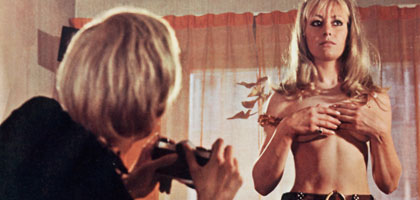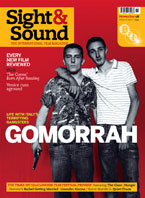Shock tactics
DVD review: Sweden, Heaven and Hell

Tim Lucas looks back on a fascinatingly twisted investigation into Sweden's supposedly permissive society
Sweden, Heaven and Hell
Luigi Scattini; Italy 1968; Klubb Super 8 Video (Sweden)/PAL Region 0; Aspect Ratio 1.37:1; Features: poster gallery, press book, trailers
Born in 1927, Italian writer/editor/director Luigi Scattini has dabbled in many different genres but remains best known for his contributions to the lower echelons of the 'mondo' movie (that distinctly Italian brand of sex-and-violence shockumentary initiated by Paolo Cavara and Gualtiero Jacopetti's Mondo cane in 1962) and, on a still more unfathomable level, to the comedy of Franco & Ciccio. His 1964 offering Primitive Love (available from Something Weird Video) went so far as to wed these strange bedfellows, contrasting the gawking Sicilian slapstick team with an overripe Jayne Mansfield, Marxist speechifying and documentary footage of bizarre tribal mating rituals.
Scattini's mondo movies - such as Sweden, Heaven and Hell (1968), a fascinatingly twisted investigation into then contemporary life in Sweden, and the putative black-magic exposé Witchcraft '70 (1970) - have become more interesting with the passage of time. Rife with staged scenes and misrepresentation galore, they at once underscore the ability of the documentary form to distort the truth at the film-maker's whim (a subject that seems especially relevant today given the rise of the internet, where anyone can say anything and lend it the same weight as newspaper print) and inhabit a fascinating twilight area which, though scandalous in the licence it takes in twisting the facts, yet is also plausibly heroic, in an anarchic sense, in its tacit condemnation of a world that accepts whatever information it's fed at face value.
Sweden, Heaven and Hell is particularly interesting as it doesn't delve into the distant jungles and Third World fleshpots usually frequented by mondo movies, but rather it looks at a country that is still generally regarded through a blindfold of media-administered biases and misconceptions, if not psychoses, dating back to the global impact of Ingmar Bergman's Summer with Monika and Vilgot Sjöman's I Am Curious (Yellow) . In essence, Scattini uses his film (and various trusting Swedish people, not to mention one or two recognisable actors) to underscore the outsider's superstitious view of Sweden as the "the most revolutionary, most permissive life-state in the world" (to quote the US poster) as well as its number-one suicide capital, while at the same time conservatively pondering the intangible relationship between these false statistics. Like the earliest exploitation films, it pretends to cast a condemning eye on the very things it exists to exaggerate and sensationalise.
Scattini's probing eye gives us transparent allegations of Swedish moonlight cruises arranged for the deflowering of teenagers; a biker subculture that subsists on rape (the victim is one of the recognisable faces of Swedish exploitation cinema, Marie Liljedahl); nightclubs for lesbians (shocking!) and for those who prefer their rock bands to perform in the nude; a reformatory for teenage murderers and prostitutes; and an enormous bunker built to allow tens of thousands to survive the midnight sun of the inevitable coming nuclear holocaust, which looks remarkably like the backstage area of a football stadium. We are also introduced to a meter maid who supposedly moonlights as a nude photographer's model; a brother and sister who moved from Stockholm to a smaller town to live as man and wife; and alcoholics forced by strict laws governing the sale of liquor to imbibe in public urinals and eat shoe polish squeezed on to crusts of bread. Each of these spectacles is given grave annotation by Edmond Purdom (the star of Michael Curtiz's The Egyptian) in the English version, and by Enrico Maria Salerno in the Italian version; the disc also provides a Spanish track with an unidentified celebrity narrator, but the only subtitle option is Swedish. Remarkably, this film never had a Swedish theatrical release, and the mind boggles at what the national reaction to such a movie might be - but the fact that it is being released by a Swedish company as an ironic souvenir of the swinging 1960s gives some indication that the country is not quite as humourless as legend would have it.
Adding still further dimension to the film's warped appeal is the soundtrack by Piero Umiliani, which mostly strikes a haunting note of romantic melancholy but also gave to the world the 1970 novelty hit 'Mah-ná Mah-ná' - the best-known mondo song since Mondo Cane's Oscar-winning 'More'. This sprightly, humorous number accompanies gratuitous footage of shy teenage girls wearing towels inside a sauna, then running outside in the snow to plunge themselves into icy waters. (You can almost hear Scattini offering a bonus to anyone who drops their towel along the way, as only one or two do.)
Klubb Super 8 Video's disc is a boldly colourful, crisp, standard-ratio presentation with a vivid selection of mono tracks; the reversible cover offers a wealth of international poster art. It can be ordered online from Klubb's website at www.klubbsuper8.com.


